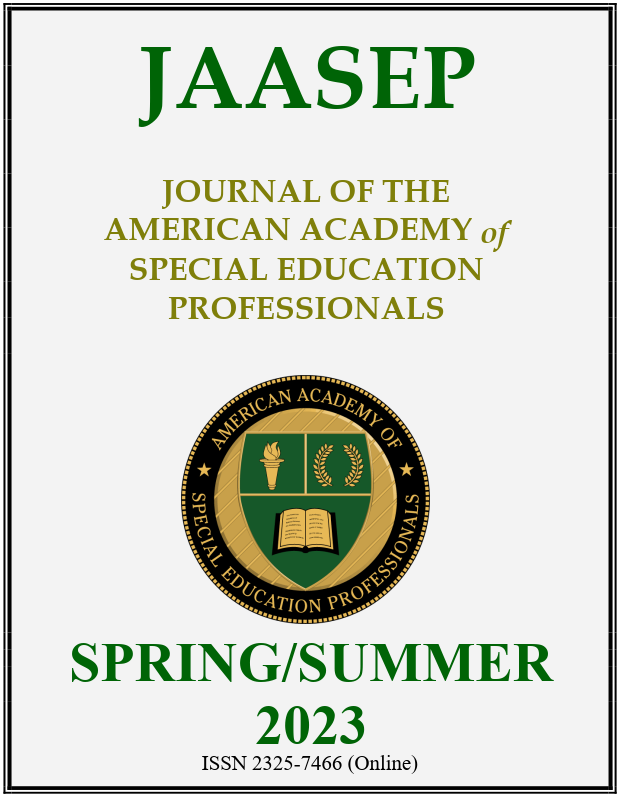Teachers’ Perceptions of School Behavior Support Systems: A Case Study
Artiles, A. J., Kozleski, E. B., Trent, S. C., Osher, D., & Ortiz, A. (2010). Justifying and explaining disproportionality, 1968–2008: A critique of underlying views of culture. Exceptional Children, 76(3), 279–299. https://doi.org/10.1177/001440291007600303 DOI: https://doi.org/10.1177/001440291007600303
Castillo, J. M., March, A. L., Tan, S. Y., Stockslager, K. M., Brundage, A., Mccullough, M., & Sabnis, S. (2016). Relationships between ongoing professional development and educators’ perceived skills relative to RtI. Psychology in the Schools, 53(9), 893–910. https://doi.org/10.1002/pits.21954 DOI: https://doi.org/10.1002/pits.21954
Duong, M. T., Pullmann, M. D., Buntain-Ricklefs, J., Lee, K., Benjamin, K. S., Nguyen, L., & Cook, C. R. (2019). Brief teacher training improves student behavior and student–teacher relationships in middle school. School Psychology, 34(2), 212–221. https://doi.org/10.1037/spq0000296 DOI: https://doi.org/10.1037/spq0000296
Eiraldi, R., McCurdy, B., Schwartz, B., Wolk, C. B., Abraham, M., Jawad, A. F., … Mautone, J.
A. (2019). Pilot study for the fidelity, acceptability, and effectiveness of a PBIS program plus mental health supports in under-resourced urban schools. Psychology in the Schools, 56(8), 1230–1245. https://doi.org/10.1002/pits.22272 DOI: https://doi.org/10.1002/pits.22272
Elrod, B. G., Rice, K. G., & Meyers, J. (2021). PBIS fidelity, school climate, and student discipline: A longitudinal study of secondary schools. Psychology in the Schools, 1-22. https://doi.org/10.1002/pits.22614 DOI: https://doi.org/10.1002/pits.22614
Estrapala, S., Rila, A., & Bruhn, A. L. (2020). A systematic review of tier 1 PBIS implementation in high schools. Journal of Positive Behavior Interventions, 23(4), 288–302. https://doi.org/10.1177/1098300720929684 DOI: https://doi.org/10.1177/1098300720929684
Fairbanks, S., Simonsen, B., & Sugai, G. (2008). Classwide secondary and tertiary tier practices and systems. Teaching Exceptional Children, 40(6), 44-52. https://doi.org/10.1177/004005990804000605 DOI: https://doi.org/10.1177/004005990804000605
Goetz, T., Bieleke, M., Gogol, K., van Tartwijk, J., Mainhard, T., Lipnevich, A. A., & Pekrun, R. (2021). Getting along and feeling good: Reciprocal associations between student-teacher relationship quality and students’ emotions. Learning and Instruction, 71, 101349. https://doi.org/10.1016/j.learninstruc.2020.101349 DOI: https://doi.org/10.1016/j.learninstruc.2020.101349
Greene, R. W. (2014). Lost at school: Why our kids with behavioral challenges are falling through the cracks and how we can help them. Scribner.
James, A. G., Noltemeyer, A., Ritchie, R., Palmer, K., & University, M. (2019). Longitudinal disciplinary and achievement outcomes associated with school‐wide PBIS DOI: https://doi.org/10.1002/pits.22282
Jones, V., Dohrn, E., & Dunn, C. (2004). Overview of problems and issues in serving students with emotional and behavioral disorders in school settings. In Creating effective programs for students with emotional and behavioral disorders: Interdisciplinary approaches for adding meaning and hope to behavior change interventions (pp. 3-31). Pearson.
Kittelman, A., McIntosh, K., & Hoselton, R. (2019). Adoption of PBIS within school districts. Journal of School Psychology, 76, 159–167. https://doi.org/10.1016/j.jsp.2019.03.007 DOI: https://doi.org/10.1016/j.jsp.2019.03.007
Laser, J., & Nicotera, N. (2011). Working with adolescents. Guilford Press.
Lei, H., Cui, Y., & Chiu, M. M. (2016). Affective teacher—student relationships and students' externalizing behavior problems: A meta-analysis. Frontiers in Psychology, 7, 1311. https://doi.org/10.3389/fpsyg.2016.01311 DOI: https://doi.org/10.3389/fpsyg.2016.01311
McGinnis, E. (2012). Skillstreaming the adolescent: A guide for teaching prosocial skills (3rd ed.). Research Press.
Morrissey, K. L., Bohanon, H., & Fenning, P. (2010). Positive behavior support. Teaching Exceptional Children, 42(5), 26–35. https://doi.org/10.1177/004005991004200503 DOI: https://doi.org/10.1177/004005991004200503
Nese, R. N. T., Kittelman, A., Strickland-Cohen, M. K., & McIntosh, K. (2021). Examining teaming and tier 2 and 3 practices within a PBIS framework. Journal of Positive Behavior Interventions, 109830072110510, 1-12. https://doi.org/10.1177/10983007211051090 DOI: https://doi.org/10.1177/10983007211051090
New York State Education Department. (2018). School report card data. Retrieved from https://data.nysed.gov
Petrasek, M., James, A., Noltemeyer, A., Green, J., & Palmer, K. (2021). Enhancing motivation and engagement within a PBIS framework. Improving Schools, 136548022110022, 1-15. https://doi.org/10.1177/13654802211002299 DOI: https://doi.org/10.1177/13654802211002299
Reinke, W. M., Herman, K. C., & Stormont, M. (2012). Classroom-level positive behavior supports in schools implementing SW-PBIS. Journal of Positive Behavior Interventions, 15(1), 39–50. https://doi.org/10.1177/1098300712459079 DOI: https://doi.org/10.1177/1098300712459079
Roorda, D. L., & Koomen, H. M. Y. (2020). Student–teacher relationships and students’ externalizing and internalizing behaviors: A cross‐lagged study in secondary education. Child Development, 92(1), 174–188. https://doi.org/10.1111/cdev.13394 DOI: https://doi.org/10.1111/cdev.13394
Shechtman, Z. (2014). Counseling and therapy groups with children and adolescents. In J. DeLucia-Waack, C. Kalodner, & M. Riva (Eds.), Handbook of group counseling and psychotherapy (2nd ed.) (pp. 585-96). Sage. DOI: https://doi.org/10.4135/9781544308555.n46
US Census Bureau. (2010). United States Census 2010. U.S. Department of Commerce.
U.S. Government Accountability Office. (2018). K-12 Education: Discipline Disparities for Black Students, Boys, and Students with Disabilities. (Publication No.GAO--18--258). Retrieved from https://www.gao.gov/products/gao-18-258.
Welsh, R. O., & Little, S. (2018). The school discipline dilemma: A comprehensive review of disparities and alternative approaches. Review of Educational Research, 88(5), 752–794. https://doi.org/10.3102/0034654318791582 DOI: https://doi.org/10.3102/0034654318791582
Winner, M. G. (2008). Think social!: A social thinking curriculum for school-age students (2nd ed.) Think Social Publishing.
Van Bergen, P., Graham, L. J., & Sweller, N. (2020). Memories of positive and negative student–teacher relationships in students with and without disruptive behavior. School Psychology Review, 49(2), 178–194. https://doi.org/10.1080/2372966x.2020.1721319 DOI: https://doi.org/10.1080/2372966X.2020.1721319
Downloads
Article Information
- Article Type Articles
- Submitted April 22, 2023
- Published June 15, 2023
- Issue Spring/Summer 2023
- Section Articles
